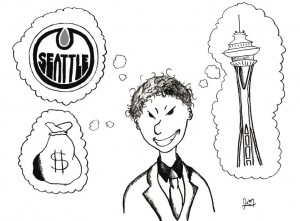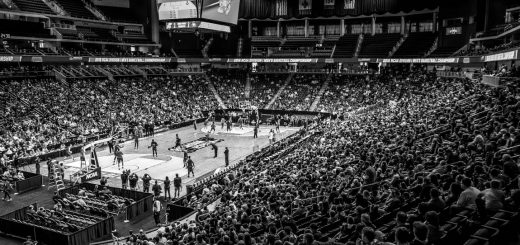A tale of two small-market cities
NHL Oilers and NBA Sonics fans lose the new arena game
Todd Colin Vaughan
Sports Editor
Daryl Katz, recluse owner of the Edmonton Oilers, made some interesting choices in the past few weeks.
The multi-billionaire owner of Rexall Drugs, in an unprecedented move, flew down to the Pacific North-West with some Oilers dignitaries including president of hockey operations Kevin Lowe.

Small market fans are just as valuable as large ones. The loss of teams in places like Seattle, Winnipeg and Quebec City is unacceptable. Illustration: Vern McGill
This group of Oilers brass was presented with a plan to showcase a new downtown arena in Seattle. The arena is designed to attract an NHL or NBA franchise to the city.
The move was predated by months of bickering between the City of Edmonton and Katz regarding the construction of a partially publicly funded arena in the city’s downtown core.
The talks over the arena, slated to cost as much as $700-million, have stalled due to Katz’ objections over how much the city promised to donate to the project.
The trip to Seattle was a means to show the City of Edmonton that the Oilers could indeed leave if a new arena is not built to replace the now ancient Rexall Place.
Following the visit, and the public outcry that followed, Katz took out two $15,000 full-page ads in both the Edmonton Sun and the Edmonton Journal to apologize and explain his actions.
The apology appeared to be fully sincere and most likely did come from the true feelings of Mr. Katz.
The issue surrounding the Oilers and the creation of the new arena, however, represents a larger issue at hand: the safety of small market teams throughout the four professional North American leagues.
Edmonton, unlike Los Angeles, Chicago or New York, cannot rely a large population and heavy corporate support to remain viable. Oiler fans, therefore, can only rely on the good graces of billionaires like Katz to keep their team home in Edmonton.
If the Oilers suddenly become a bad investment due to losing seasons, bad ticket sales or low corporate support, then Katz can simply rid himself of a bad investment or move the team to another market like Seattle.
This issue is particularly difficult for Oilers fans to stomach after a late ‘90s affair with then-owner Peter Pocklington, who could no longer afford to run the team and was also searching out new suitors.
Simply stated, a team with a rich history of winning and strong fan support could no longer exist in a matter of months, depending on the whims of the current owner.
This travesty is not unique to Edmonton. In fact, Seattle, as mentioned earlier, built a new arena after losing their NBA franchise the Supersonics.
The Sonics, after being in Seattle for 41 years and winning an the 1979 NBA championship, were forced to relocate to Oklahoma City after ownership was unable to reach an agreement to replace the aging Key Arena.
Because of small market issues and low corporate support, fans lost their professional franchise and now are left begging for another. This meant that Katz, although not intentionally, hurt both Oilers fans and Sonics fans by visiting the hard-luck town.
Do cities and fans have to suffer simply because there’s no celebrities sitting in the stands of their arenas?
Are Oilers and Sonics fans not as valuable as the fat-cats in New York and Los Angeles?
Once again, the economics of professional sports have placed a higher value on the box seat then the 3rd-tier bleachers.
Corporate glad-handing between uninterested business clients are the real catch, rather then the nine-year-old that can tell you every single stat of every player on the ice while watching his first game.
If Edmonton lost the Oilers, the city would economically survive contrary to the concerns of both Katz and the municipal government.
It’s the thousands of fans who wouldn’t recover. They would be left to beg much like the hard-luck fans of Seattle are forced to now.
Arenas are hard to build. They’re expensive. They require land. Not every citizen is a sports fan. This is not a call to build one. This is a call to not hold small market fans hostage simply because there is no room for more box seats in Rexall Place in Edmonton or Key Arena in Seattle.
Mr. Katz does seem to understand the passion fans have for their Oilers, an understanding not shared by many owners in professional sports. Hopefully, this understanding means that relocation was simply an ill-advised idle threat and not foreshadowing for another sad day in the history of small markets.





